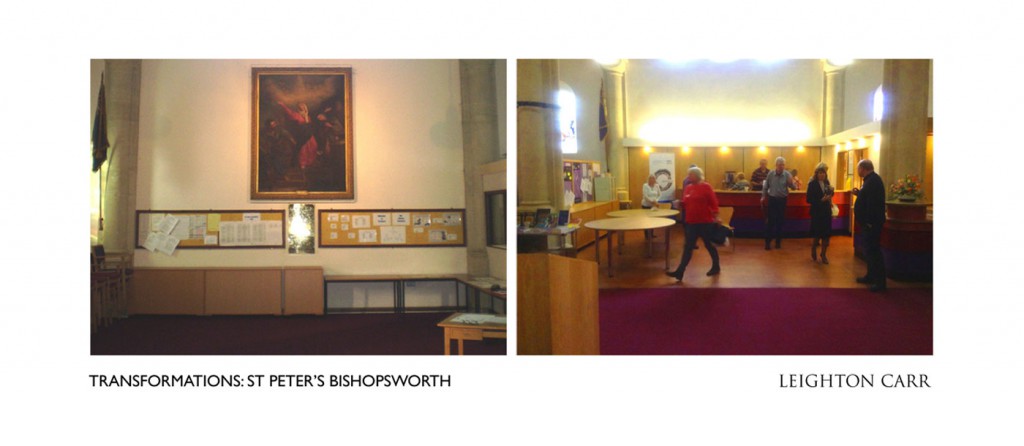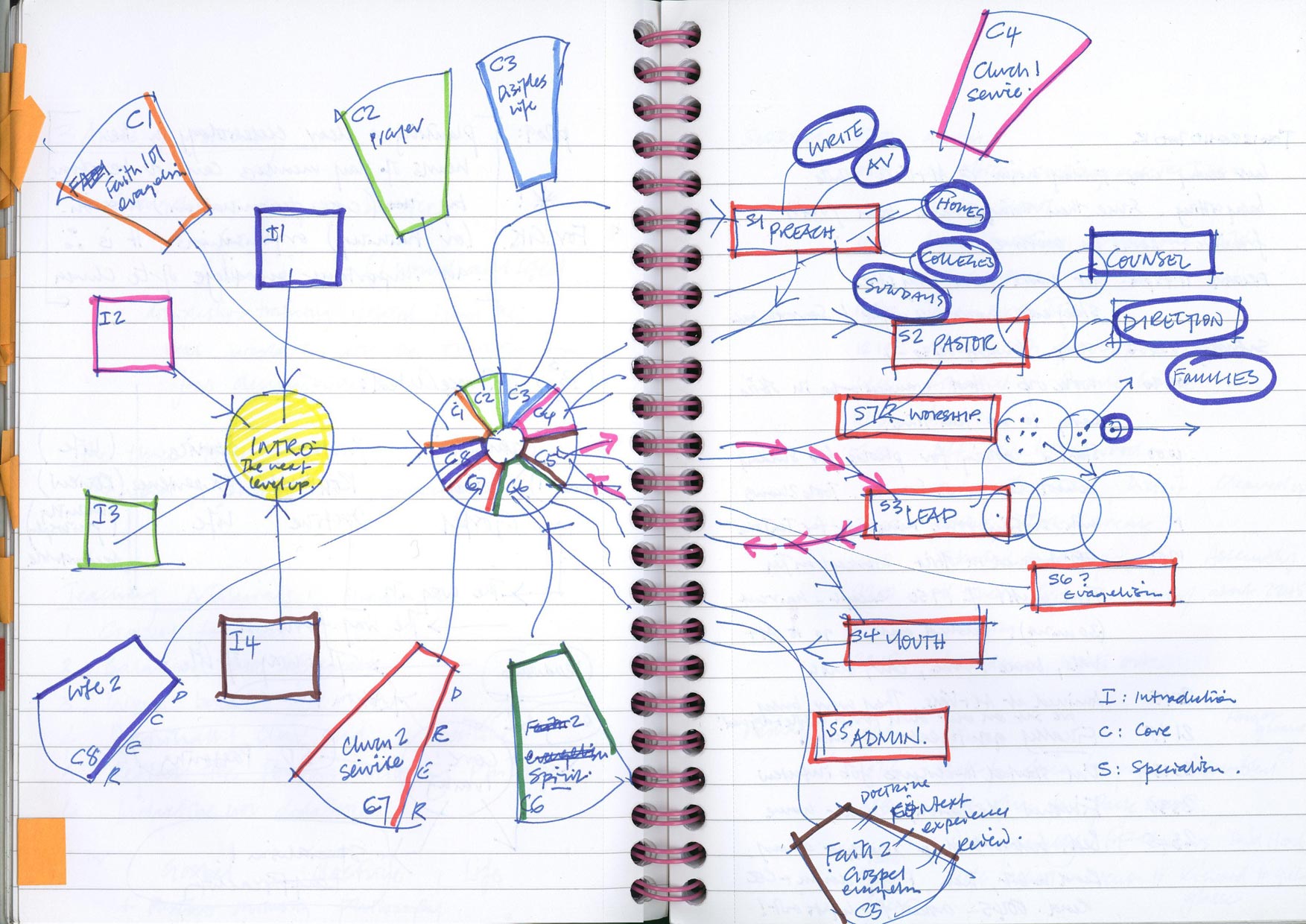Today is the penultimate day of clearing out my office. I’m cooking. it’s 9pm and I’m sitting in the kitchen, waiting for the pork chops with celeriac and apple and new potatoes to reach perfection. And I’m exhausted!\r\n\r\nThe office move has taken six weeks. That’s six weeks of clearing space in my small home to make space for the equipment, materials and furniture I’m moving from my small office. It’s amazing how much can be carefully slotted into small spaces.\r\n\r\nAnd tomorrow is adverts day for jobs in the Church of England, and along with at least six of my contemporaries that I know about I will be studying the options and possible moves around the country.\r\n\r\nI’m hoping that exactly the right job appears but the reality is that it’s hard to get a job in the church at the moment. This is partly due to the large reduction in full time clergy posts taking place across the country, plus the unusually high number of existing experienced clergy currently looking for a change in post, plus the high number of curates looking too, many of whom would make excellent incumbents, and perhaps my unusual personal style and CV won’t help me land a traditional role either.\r\n\r\nSo from this weekend I’m without work, without an office, and looking for a job in a highly competitive field.\r\n\r\nOn Tuesday I wake up with nothing in the diary and nowhere to go.\r\n\r\nGreat!\r\n\r\nNo really … great!\r\n\r\nI do not expect the Church of England to be the answer to my personal needs – for money, security, purpose or satisfaction in ministry. I am responsible for my own well being. The church doesn’t owe me. And likewise I remain open to the fact that churches (or even The Church) might not think I’m the answer to it’s needs at this time.\r\n\r\nIt may be a pedantic semantic clarification, but the call on my life is God’s call not mine. I may aspire to say my time is God’s time, but the opposite is true too: His time is my time. We have a shared history, God and I, and it’s brought us to this place: my history in some way a part of His history.\r\n\r\nAnd so with pockets full of skills and experiences and creativity, if I’m not chosen for the jobs I think are ideal for me – I’ll make my own future in a place where we (me, the people I live with, God) can flourish.
Author: Leighton Carr
Problems with Pioneers – Personal Funding
In a previous related piece – Problems with Pioneers – Revex v Capex Funding – the argument was made that funding pioneers out of diocese or local church funds is difficult, and it’s better for pioneers to obtain their own funding.\r\n\r\nPaul gave us the biblical model for this when he used funds raised in Macedonia to pay for his work in Corinth and from Philipi for his imprisonment in Rome. And when the funding ran out in Thessolonica he and his companions “…worked our fingers to the bone, up half the night, moonlighting so [they] wouldn’t have the burden of supporting them while we proclaimed God’s Message to you”.\r\n\r\nSo before launching out Pioneers need to ask two basic questions. First …\r\n\r\n…do you back yourself to succeed?\r\n\r\nThen ask the question any investor would ask …\r\n\r\n…Why? How do you know? Where’s the evidence? Are you being honest and realistic? (that’s four, I know)\r\n\r\nAnd there is a third question for those who are married…\r\n\r\n…does my husband/wife agree to using our current funds for ministry rather than for our family and pension?\r\n\r\nIf all these questions can be answered positively then crack on and … work out the sums.\r\n\r\nThere are entrepreneurial ways of funding church planting, but the traditional model is to fund one or two ministers for three to five years. So allow £50,000 for one full time minister with a family per year. That’s £250,000 for five years. And don’t forget the possible cost of hiring a venue and equipment.\r\n\r\nSo now all the ducks are in a row, its time to … think about the ‘ownership’ problem.\r\n\r\nIf you can back yourself and raise your own funds why would you do it for a denomination that will not participate in the risk? And if you plant a successful church, and the denomination has not participated in the risk, why would you give them the benefit of your income stream and assets and resources?\r\n\r\nStill interested? Can you afford it? Family on board? Agreed terms with your denomination?\r\n\r\nIf yes – it’s time to plan.\r\n\r\nIf no – it’s time for the church to rethink funding options for church planting …
Transformations: St Peters Bishopsworth (1)
Darkness
Simple connections can be thought provoking and prayer directing.
\nIf we notice them.
\nLike this connection yesterday.
\n
In the morning, using everyday morning prayers, the set reading was the Song of Zechariah
\n
“In the tender compassion of our God
\n the dawn from on high shall break upon us,
\n
To shine on those who dwell in darkness and the shadow of death
\n and to guide our feet into the way of peace.”
\n
That made me think for a long time about the nature of the darkness the world is engulfed in. Surely, I thought, those that dismiss the idea of sin can’t have another satisfactory explanation for the darkness that covers so many lives, who DWELL in darkness.
\n
In the evening, searching for some suitable hymn for an event, I read the lyrics of the hymn “O Church Arise” by Stuart Townend and Keith Getty which has the snippet:
\n
O church arise …..
\n
… An army bold
\nWhose battle cry is love
\nReaching out to those in darkness
\n
(http://www.worshiptogether.com/)
\n
So, the tender compassion of our God breaks in upon us, and we, the church reach out.
\nThese are linked.
\nGod shines through us reaching out. Or, as we shine in the world God reaches out.
\n
Either way, the connection was small – one word, darkness – but enough to make me pause twice and pray.
\n
The first step, of course, is to notice.
\n
G.L.A.D. – A church near you?
At a conference I attended recently one of the speakers – going ‘off piste’ from his subject of The Environment – started musing openly about various facets of church life, increasing in confusion until he finished with ‘…but what is church anyway?’.
\n
“For goodness sake, is it really that complicated?” I thought, as I do so often nowadays when people pontificate in confusion on this subject.
\n
Anyway, I have my own mnemonic for the simple definition of an effective church, which is G.L.A.D. – being
\n
\n
G – gathered in worship, praise and prayer
\n
L – learning together from experience and scripture
\n
A – active in witness and service inside and outside the church
\n
D – distinctive as a community – living well in difficult times.
\n
\n
So, how do you become an effective church leader?
\n
Keep it simple and focus on these few key essentials of an effective church.
\n
(… closely related to ‘The Big Four of Discipleship’)
\n
A Portfolio of Posts and Publications
Discipleship Strategy
A Closer Look at Internet Addiction
One of the sites I follow on my Twitter account is Urban Times. Being an avid city lover I was attracted to the site by its urban focus, but they often have interesting pieces like this one on Internet Addiction. It’s worth checking out for everyone, but especially if you have young children, or if you are already an Internet Addict!!\r\n\r\nA Closer Look at Internet Addiction.
Problems with Pioneers – Revex v Capex Funding
Where does the money for organisational growth come from?\r\n\r\nIn business, the first place to look for new project funding is usually from revenue; can growth be funded out of revenue expenditure – or revex?\r\n\r\nBut increasing revex without increasing income reduces profit, and depending on the speed of return from the new investment this lower bottom line can cause problems in cash flow, confidence and shareholder patience.\r\n\r\nSo can new project funding be justified out of capital expenditure – or capex?\r\n\r\nIt depends. While capex is limited usually to acquiring or improving physical assets, it may be sometimes possible to use capex to start a new business to grow the company.\r\n\r\nBut again the bottom line is – the bottom line: in broad terms any capex investment reduces reserves and unless it can be proven that the investment is either acquiring a genuine asset or creating an opportunity for a certain return, why risk it?\r\n\r\nSo if growth can’t be funded from revenues, asset management or cash reserves, that leaves outside investment from increasing shareholder cash, or increasing debt by borrowing. Again, the simple question has to be asked: why would anyone want to do it? Is it realistic? A good rule is: if it’s such a good idea – borrow from the bank. If that’s a problem, then there’s a bigger problem with the idea.\r\n\r\nNow think about a local church wanting to start a pioneer ministry. How can they pay for it?\r\n\r\nWhat about revex? The reality is that most churches are on the breadline, and don’t have surplus money from income to invest.\r\n\r\nWhat about capex? Again, not realistic as most local churches have no strong cash reserves, and even churches with assets find it difficult to reorganise long term assets to release extra funds in the amounts needed to support a pioneer ministry.\r\n\r\nWhat about Head Office investment – in the Church of England this would be the diocese. Would they invest? Well, how would they? Why would they? With voluntary income generally reducing, value of investments declining, and increases in costs only being mitigated by reducing clergy numbers, what compelling argument can be made to fund some new venture with (usually) untried pioneers?\r\n\r\nWhich leaves ‘shareholder’ investment – raising funds from organisations or individuals either inside or outside the church. And that raises rather complicated questions of ownership – who’s buying what and who eventually owns what?\r\n\r\nSo. Want to be a pioneer? Then more likely than not you’ll have to find your own support.\r\n\r\nThe Apostle Paul understood 2,000 years ago that it’s better this way.
Numbers that Count
A well known British company – in one year:\r\n\r\n· Revenue up 8.4 per cent to £10,827 million.\r\n· Operating profit before exceptional items £274 million.\r\n· Operating profit of £233 million.\r\n· Loss before tax from continuing operations £139 million.\r\n\r\nA little known Chinese evangelist – in one year:\r\n\r\n· Travelled 58,000 miles by train, bike, rickshaw and mule.\r\n· Preached to 400,000 people.\r\n· Of these 18,000 became Christians.\r\n· From these 827 preaching bands were established to evangelise China.\r\n\r\n I know which numbers I would want on my gravestone …













